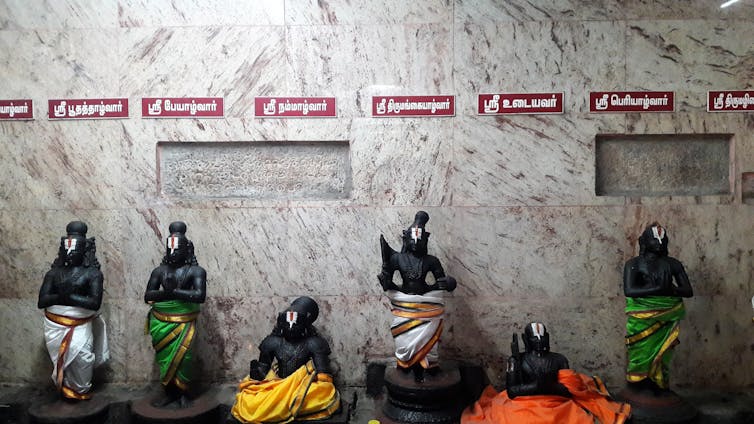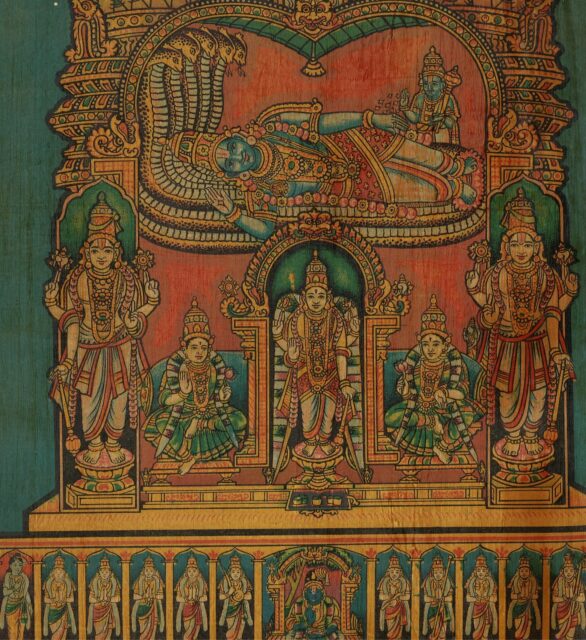(The Conversation) — Valentine’s Day often revives attention on romantic themes in literature. Stories are cited in media with the aim of helping people navigate the demands of the human heart on a day that has become intimately associated with romantic love.
One literary tradition rarely highlighted is that of Hindu “bhakti” or ecstatic devotion, which birthed some of the most stirring mystical poetry composed in the world. The earliest bhakti poems were composed in Tamil, a classical Indian language, in praise of the two great gods of Hinduism — Shiva and Vishnu.
While the poet-devotee adopts many attitudes in relation to their chosen deity, one of the most common is the relationship between a human lover and divine beloved. This is especially true in the poems to Vishnu, which I study, where many male poets assume the female voice to express their longing for union with the divine beloved, conceived as male.
Poetics of longing
The Tamil poet-devotees to Vishnu lived between the sixth and ninth centuries in the Tamil-speaking regions of peninsular India. Because they are in eternal contemplation of Vishnu, they are called the “alvar” or the “Immersed Ones.”
There are 12 alvar poets, all from different social backgrounds, including one woman, named Kodhai. Much of the alvars’ poetry reveals an intense longing for a silent and absent god, so much so that it has been called “viraha bhakti,” or devotion in separation.
The love appears, at least as presented by the poet, as completely one-sided – sparked by a chance encounter with a mysterious and inscrutable deity. It is an unshakable and transformative love that roots itself deep in the poet.
Some male alvar poets adopt the female voice to give full-throated expression to their love for the beautiful male deity Vishnu in all his many forms. The use of a female voice by a male poet is not unusual in the Tamil or Sanskrit literature. But what distinguishes the male bhakti poets’ female voice is the structure of bhakti poetry itself, where the poet and the voice in the poem are read as identical.
Thus, what is in the poem is received by the bhakti traditions as autobiographical accounts of the ups and downs of their desire for a permanent union with the divine beloved. Then, from this perspective, the male poet uses the gender switch to explore bhakti’s emotional terrain, particularly as an embodied and physical love for god. In the words of a 13th century commentator, the poet chooses his own voice in the fleeting moments of union, but the female voice in the endless time in separation.

Images of alvar poets in Ninra Narayana Perumal temple in the south Indian state of Tamil Nadu.
Ssriram mt/ Wikimedia Commons, CC BY-SA
These male poets deploy the full range of archetypal female characters that populate Tamil classical love poetry – the heroine, her mother, her friend and the fortuneteller from the hills – to describe their love for Vishnu.
To this cast of characters, the poets also occasionally use, as Kodhai herself does, mythological female figures. The cowherd women of the wondrous town of Vrindavan, where the youthful divine Krishna is eternally at play, is a particular favorite for the alvar poets.
Male poets and female voice of longing
Two ninth century alvar poets, Nammalvar and Tirumankai, are particularly deft in their use of these female voices of longing. Their heroine dominates their poems; her tone in turns demanding, insistent and despairing as she seeks through language to call the absent divine beloved back to her.
To do this, she vividly describes the mesmerizing beauty of the god, manifesting him before her in words, when she can’t have him in an embodied form. Simultaneously, she describes the agonizing effects of her love, hoping the god will show compassion toward her.
In one such verse, Nammalvar, in the voice of a lovelorn heroine, says:
Worse than the fiercest fire
is the fine powdered darkness of night
the tall chariot of the beautiful sun doesn’t appear,
my beloved, his eyes bright as lotus-blooms, does not come
Who can end my heart’s grief?
I dissolve to nothing. (Tiruvaymoli, V.4.9.)
If the heroine provides a catalog of her lovesickness, the additional voices of mothers, friends and fortunetellers comment on it. They are the outside observers of the external manifestation of the heroine’s and the poet’s own inner turmoil and desperate desire for union with the divine.
Love in many shades
Not all the male alvar poets use one of these archetypal female voices, and a female voice does not always have to speak about romantic love. Some poets such as the late eighth-to-ninth century Kulasekhara Alvar adopt the persona of the doting mother of the Hindu Gods Krishna or Rama, who is also considered an avatara of Vishnu.
In these guises, they sing lullabies to him, adorn him and imagine, like mothers do, a magnificent future for their child. These poems are not composed from the vantage of separation; rather, they are poems of intimacy and joy, celebrating maternal love.
There is, however, one exception to these joyful maternal poems. In a wrenching set of 10 verses in his poem “Perumal Tirumoli,” Kulashekara Alvar speaks in the voice of Devaki, Krishna’s birth mother, who is forced to give him up to protect his life. In these 10 verses, the poet as Devaki laments the misfortune that prevented her from raising her son, juxtaposing her inconsolable grief with the immeasurable joy of Krishna’s foster mother, Yashoda.
In the poems of the alvar, love, directed toward Vishnu, takes many forms: humble service; unconditional, protective maternal adoration; and the intense intimacy of lovers. Composed from the vantage of separation and rendered in the female voices of women – mothers and abandoned lovers – these poems offer a unique understanding of the mysterious bond that exists between god and his dearest devotees.
(Archana Venkatesan, Professor of Religious Studies and Comparative Literature, University of California, Davis. The views expressed in this commentary do not necessarily reflect those of Religion News Service.)
![]()





